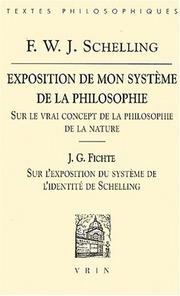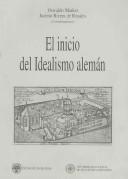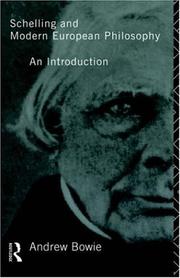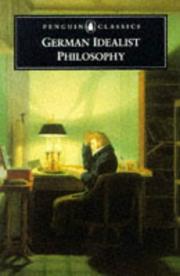| Listing 1 - 10 of 360 | << page >> |
Sort by
|

ISSN: 02497972 ISBN: 2711614530 9782711614530 Year: 2000 Publisher: Paris : Librairie J. Vrin,
Abstract | Keywords | Export | Availability | Bookmark
 Loading...
Loading...Choose an application
- Reference Manager
- EndNote
- RefWorks (Direct export to RefWorks)
Book
ISBN: 9781443863896 Year: 2014 Publisher: Newcastle upon Tyne Cambridge Scholars Publishing
Abstract | Keywords | Export | Availability | Bookmark
 Loading...
Loading...Choose an application
- Reference Manager
- EndNote
- RefWorks (Direct export to RefWorks)

ISBN: 8489784043 9788489784048 Year: 1996 Publisher: Madrid: Editorial Complutense,
Abstract | Keywords | Export | Availability | Bookmark
 Loading...
Loading...Choose an application
- Reference Manager
- EndNote
- RefWorks (Direct export to RefWorks)

ISBN: 9780415103473 0415103479 Year: 1993 Publisher: London: Routledge,
Abstract | Keywords | Export | Availability | Bookmark
 Loading...
Loading...Choose an application
- Reference Manager
- EndNote
- RefWorks (Direct export to RefWorks)
Book
ISBN: 281030338X 9782810303380 Year: 2023 Publisher: Lyon: Cosmogone,
Abstract | Keywords | Export | Availability | Bookmark
 Loading...
Loading...Choose an application
- Reference Manager
- EndNote
- RefWorks (Direct export to RefWorks)
L'idéalisme allemand ne constitue pas, à lui seul, le tout de la philosophie occidentale du XIXe siècle, un séminaire se devait d'envisager des alternatives critiques à la pensée d'une raison absolue et systématique. C'est le cas chez Nietzsche, dont sont proposées ici plusieurs présentations quelque peu divergentes ; c'est aussi le cas chez Heidegger, à propos duquel une contribution montre que l'affirmation bien connue "Seul un Dieu peut encore nous sauver" peut se lire comme une réponse à la question posée par Nietzsche "Wer kann uns noch retten ?", réponse qui , à travers la thématisation du Geviert, et du rapport entre mortels et immortels qui s'y joue, mène, au-delà de Hiilderlin, à une pensée du dernier Dieu, étrangère à tout christianisme, qui participe, comme chez Jung, du fantasme d'un "réenchantement du monde". (4e de couv.)
Book
Year: 2021 Publisher: Berlin : De Gruyter,
Abstract | Keywords | Export | Availability | Bookmark
 Loading...
Loading...Choose an application
- Reference Manager
- EndNote
- RefWorks (Direct export to RefWorks)
What can we know about ourselves and the world through the sense of touch and what are the epistemic limits of touch? Scepticism claims that there is always something that slips through the epistemologist's grasp. A Touch of Doubt explores the significance of touch for the history of philosophical scepticism as well as for scepticism as an embodied form of subversive political, religious, and artistic practice. Drawing on the tradition of scepticism within nineteenth- and twentieth-century continental philosophy and psychoanalysis, this volume discusses how the sense of touch uncovers contradictions within our knowledge of ourselves and the world. It questions 1. what we can know through touch, 2. what we can know about touch itself, and 3. how our experience of touching the other and ourselves throws us into a state of doubt. This volume is intended for students and scholars who wish to reconsider the experience of touching in intersections of philosophy, religion, art, and social and political practice.
Book
ISBN: 9783110673647 9783110673692 311067369X Year: 2020 Publisher: Berlin de Gruyter
Abstract | Keywords | Export | Availability | Bookmark
 Loading...
Loading...Choose an application
- Reference Manager
- EndNote
- RefWorks (Direct export to RefWorks)
Book
Year: 2021 Publisher: Berlin : De Gruyter,
Abstract | Keywords | Export | Availability | Bookmark
 Loading...
Loading...Choose an application
- Reference Manager
- EndNote
- RefWorks (Direct export to RefWorks)
What can we know about ourselves and the world through the sense of touch and what are the epistemic limits of touch? Scepticism claims that there is always something that slips through the epistemologist's grasp. A Touch of Doubt explores the significance of touch for the history of philosophical scepticism as well as for scepticism as an embodied form of subversive political, religious, and artistic practice. Drawing on the tradition of scepticism within nineteenth- and twentieth-century continental philosophy and psychoanalysis, this volume discusses how the sense of touch uncovers contradictions within our knowledge of ourselves and the world. It questions 1. what we can know through touch, 2. what we can know about touch itself, and 3. how our experience of touching the other and ourselves throws us into a state of doubt. This volume is intended for students and scholars who wish to reconsider the experience of touching in intersections of philosophy, religion, art, and social and political practice.

ISBN: 0140446605 Year: 1997 Publisher: London Penguin books
Abstract | Keywords | Export | Availability | Bookmark
 Loading...
Loading...Choose an application
- Reference Manager
- EndNote
- RefWorks (Direct export to RefWorks)
Book
ISBN: 0674038584 Year: 2003 Publisher: Cambridge, Massachusetts ; London, England : Harvard University Press,
Abstract | Keywords | Export | Availability | Bookmark
 Loading...
Loading...Choose an application
- Reference Manager
- EndNote
- RefWorks (Direct export to RefWorks)
Dieter Henrich's lectures on German idealism were the first contact a major German philosopher had made with an American audience since the onset of World War II. They remain, to this day, one of the most eloquent interpretations of the central philosophical tradition of Germany and the way in which it relates to the concerns of contemporary philosophy.
| Listing 1 - 10 of 360 | << page >> |
Sort by
|

 Search
Search Feedback
Feedback About UniCat
About UniCat  Help
Help News
News